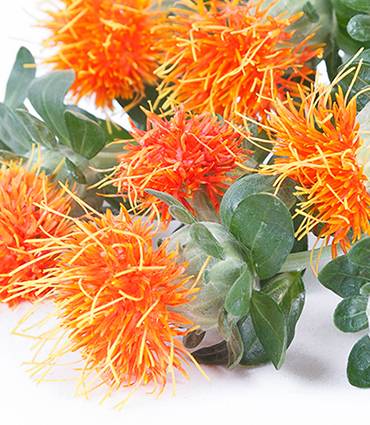Safflower

Latin name :
Carthamus tinctorius L.
Common Name :
Safflower
Family :
Asteraceae
Origin :
North Africa
Part of the plant used :
Oil
Description
Safflower is a Mediterranean plant whose shimmering colours have earned it, among other nicknames, that of the Indian Sun. This plant of the Asteraceae family is used as a medicinal plant for its phytotherapeutic properties.
Safflower oil is obtained from the seeds of the plant by cold pressing. This oil is composed of unsaturated fatty acids, including omega-6, and more particularly linoleic acid (between 65 and 80%), and oleic acid, the main member of the omega-9 family (between 10 and 20%). Safflower oil also contains saturated fatty acids such as stearic acid and palmitic acid. Antioxidant vitamin E and vitamin K are also present.
Safflower oil is antioxidant and nourishing. It softens and soothes the skin and has a regenerating effect on it. It also has antifungal and healing properties and is often recommended for eczema, dry skin (including scalp) and minor burns.
The benefits
Safflower oil, obtained by cold pressing the plant's seeds, is known to promote skin hydration thanks to its fatty acid composition. It brings shine and luster to the hair by reinforcing the hydrolipidic film of the hair shaft.
In addition, safflower oil inhibits the formation of adipose tissue (tissue where fat is stored).
Scientific publications
Safflower oil is the subject of more than 2459 scientific publications.
Our products based on Safflower oil
-
€23.70











